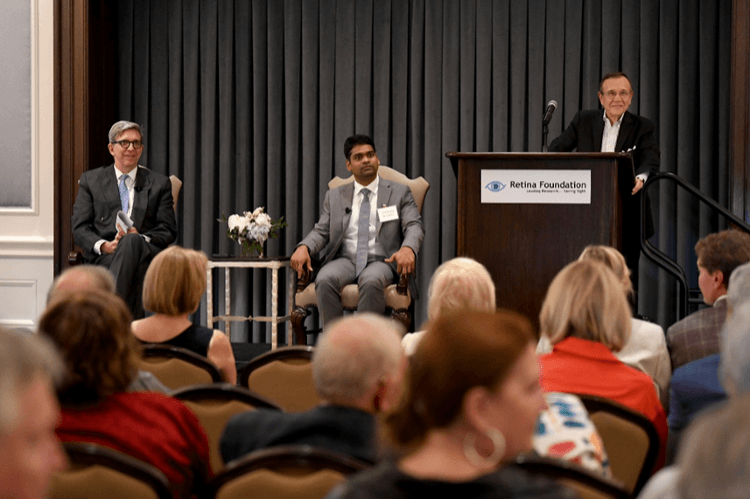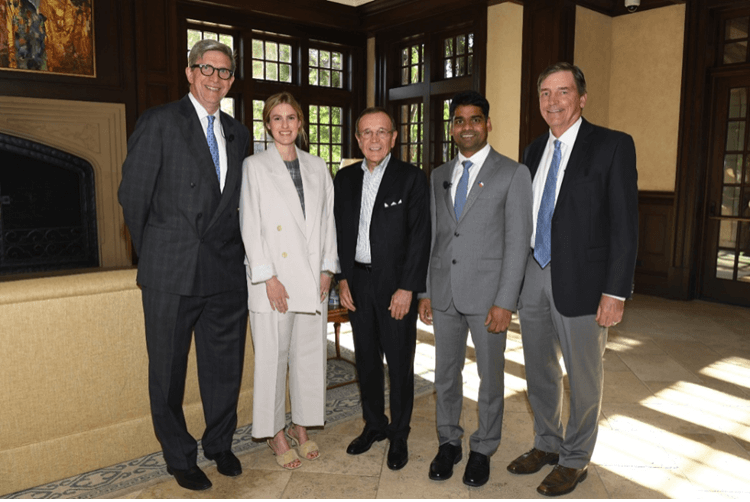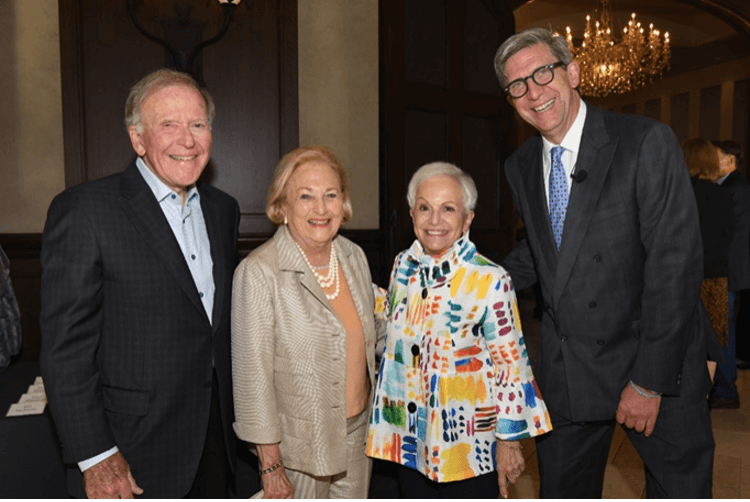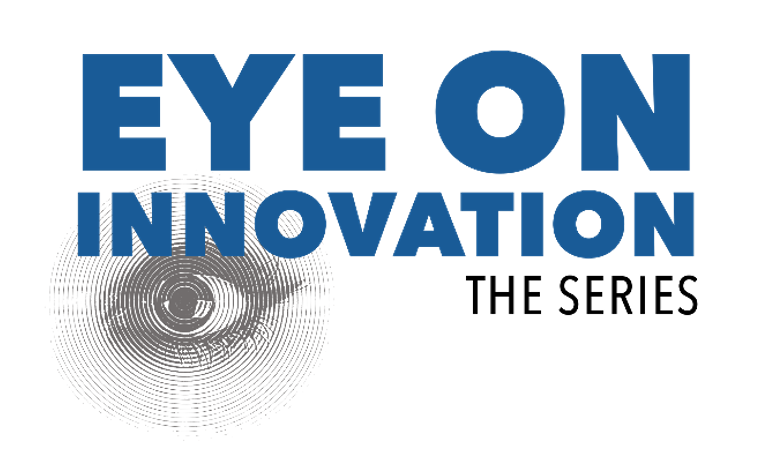Retina foundation showcases breakthroughs for treatment of age-related macular degeneration during eye on innovation conversation series
Series highlights the groundbreaking work of AMD team utilizing patients’ own stem cells

After Dr. Karl Csaky (left) and Dr. Sri Sripathi (middle) ended their conversation about advanced stem cell research that will someday preserve and save vision, Retina Foundation Chair Lou Grabowsky (right) closed the Foundation’s Eye on Innovation event saying, “We have more than hope at the Retina Foundation. We have the knowledge, environment and technology that will manifest that hope into reality.”
DALLAS – A cross-section of leaders from the North Texas region’s business, civic, philanthropic and medical communities gathered to learn about the future of personalized medicine through stem cell research during the Retina Foundation of the Southwest’s revamped lecture series “Eye on Innovation: Next Generation Stem Cell Research in Age-Related Macular Degeneration (AMD).” The event was held at the Dallas Country Club.
With a proud history of groundbreaking discoveries in eye health, the Retina Foundation is the world class leader in the treatment and pursuit of a cure for AMD, which is the most common cause of vision loss for individuals 50 years and older in the U.S.
A progressive and generational eye disease suffered by an estimated 18 million Americans, AMD causes people to lose their ability to read, drive a car or see a loved one’s face. As the 50+ age group is predicted to double by 2050, cases of AMD will rise as well.
Dr. Karl Csaky, CEO and Chief Medical Officer at the Retina Foundation, and Dr. Srinivasa Sripathi, Director of the new AMD Stem Cell Laboratory at the Retina Foundation, shared how with Nobel Prize winning technology, their next generation research is yielding personalized medicine, utilizing a patient’s own stem cells to create healthy retinal cells.
“The Retina Foundation is committed to accelerating our stem cell research efforts to realize a profound impact on patient care, ultimately improving the vision and quality of life for AMD patients,” said Dr. Csaky. “Our only priority is our patients.”
The Retina Foundation’s patient-centric research approach allows the team to reach clinical trials faster, accelerate solutions for FDA approval, increase efficiency and efficacy, and change lives of AMD patients. Doctors and scientists are able to see the full picture – groundbreaking lab work paired with real-time patient connections and relationships.
Under the guidance of Dr. Sripathi’s enterprising research, stem cells can be used to identify what medicines would be most effective in preventing critical eye cells from dying for that specific patient.
Dr. Sripathi said, “This innovative research helps us further understand AMD and discover new therapies. Already knowing many genetic risk factors from AMD patients, we will look for abnormalities and study how these retinal cells are degenerating.”
He also explained that with genome editing technology, they will go into a patient’s eye cells to reverse the mutation of the gene that causes AMD in those cells.
“The world-class reputation of the Retina Foundation, the progress they have already made with AMD, and our patient-centric vision of the future spurred my decision to join the team to advance my ocular stem cell research,” said Dr. Sripathi. “We are agile and committed to moving quickly to find solutions for our AMD patients.”

(From left to right) Dr. Karl Csaky, Julia Sands Cunningham, Lou Grabowsky, Dr. Sri Sripathi, and John Dziminski gather at the Dallas Country Club for the Retina Foundation’s Eye on Innovation Series. Dr. Csaky and Dr. Sripathi led a conversation about advanced stem cell research in combatting retinal disease. Cunningham and Dziminski with The Rosewood Foundation shared their support of the innovative research the Retina Foundation is leading to save sight. Grabowsky, Chairman of the Board at the Retina Foundation, ended the evening’s program by saying, “We have more than hope at the Retina Foundation. We have the knowledge, environment and technology that will manifest that hope into reality.”
The implications of the research go far beyond AMD and could provide quality of life enhancements for other eye diseases, including inherited eye diseases.
AMD cases will continue to rise along with our aging population, yielding significant impacts. Workforce productivity and personal independence decline as macular degeneration increases, while health care costs and stress on families and caregivers increase. The global cost of visual impairment due to AMD is $343 billion, including $255 billion of indirect health care costs.
Julia Sands Cunningham, trustee of the Rosewood Foundation and granddaughter of Ms. Hunt, expressed that the Rosewood Foundation’s and her family’s enthusiasm for the work of the Retina Foundation stemmed from her grandmother’s own personal experience of slowly losing her eyesight. “Our organizations share the same vision — to make meaningful contributions to improve the quality of life for present and future generations,” she said.
The Caroline Rose Hunt Family and The Rosewood Corporation served as the evening’s hosts. The Mason Brown Family Foundation and William L. Hutton, M.D., a founder of the Retina Foundation, sponsored the event.
The Retina Foundation will host its next Eye on Innovation event, “Artificial Intelligence, Gaming and the Future of Medicine,” on November 16 at the Dallas Country Club.
For more information on becoming involved with a study or to learn more about the Retina Foundation, please visit www.retinafoundation.org.

(From left to right) Bobby Lyle, Margot Perot, Lottye Lyle and Dr. Karl Csaky gather at the Dallas Country Club for the Retina Foundation’s Eye on Innovation Lecture Series. Dr. Csaky, the chief executive and medical officer of the Retina Foundation, joined Dr. Sri Sripathi, director of the Age-Related Macular Degeneration (AMD) Stem Cell Laboratory at the Foundation, to discuss the latest advancements in stem cell research leading to personalized medicine for patients with AMD and other retinal eye diseases.

Related Articles
Three Patents Awarded for Retina Foundation’s Two-Layer Ocular Implant in Japan, Europe and the United States Gene Therapy Trial for Choroideremia Join Drew Brees and the Retina Foundation for the Third Annual Visionary Luncheon – March 4, 2020 Retina Foundation Participates in International Effort to Treat Stargardt Disease Retina Foundation 20/20 Video Research Updates